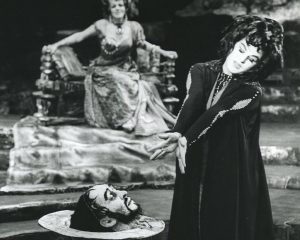Ord Om ordet
Johannes Døperens martyrdød
The beheading of John the Baptist impinges directly on the unfolding of the Gospel. As long as the last of the prophets prophesied, the manifestation of the kingdom was lodged in the future. Then, when the voice in the wilderness rang out no more, deafening silence ensued. What would happen next? Christ himself appears to have been unsure. We see him hesitating for a moment, withdrawing from the crowds to a solitary place. And there, on the Baptist’s home ground, he performed the sign that would make it clear, to seeing eyes and hearing ears, that yes, it had begun. Feeding the multitude with miraculous bread, Christ inaugurated the wedding feast John had proclaimed.
Given the importance of the event we commemorate, we cannot fail to be struck by the squalor of its circumstances. We know King Herod from several passages in the Gospel, also from Josephus and other historians. We know him to be a weak ruler, conceited and unprincipled. How gladly he listened to John! How cavalierly he ignored what he heard! Over and beyond such spinelessness, today’s account presents him in a light that is positively lurid. Reclining at an executive luncheon, he is so enthralled by the suggestive charms of his stepdaughter that he promises to give her anything —well, almost anything—to show his appreciation. The gruesome request that followed shook him, yet Herod was bound by his word, his vain and presumptuous word. John was executed forthwith, with the guests still at table. A lecherous king, a jealous queen, a fickle child: should these bring the Old Testament to a close?
Let us next cast a glance at John himself. The Gospels let us understand that he began, in the course of his imprisonment, to ask probing questions about his ministry and significance. At the Jordan, when he emerged into public view after years of ascetic preparation, his voice had been thunder. Without hesitation he had pointed to the dawn of God’s reign on earth. When he recognised its agent ‘standing among you’, he proclaimed him and bowed down to him. In the solitude of Herod’s prison, however, he began to rethink matters. Had he, in fact, been right? The embassy he dispatched to Jesus was charged to ask a real, not a rhetorical question: ‘Are you the one?’ We appreciate the urgency of the enquiry. It is one thing to give one’s life for the truth. It is quite another thing to give it for a well-meant but sorry miscalculation.
At this decisive juncture, then, where we should have liked to find staunch resolve in a noble setting, the picture before us is rather melancholy. That is why today’s commemoration is important to our Christian lives, for it presents a scenario that is accessible, somehow, and true to the continuing experience of discipleship, which is seldom glamorous. It may be useful to recall that the man whom we in the West call the Baptist is known in the Greek tradition under another title. To Eastern Christians, John is preeminently ὁ προδρόμος, the Forerunner. The reference embraces more than just his preaching. It is John’s entire life that mysteriously indicates the Saviour’s life. His death is likewise a sign.
If we consider a small handful of heroic Christian witnesses close to us in time, we find that their story in many ways matches John’s. Think of Edith Stein, the philosopher, herded into a ghastly machinery of destruction as a faceless woman in an anonymous herd. Think of Alexander Men, a celebrated priest and teacher, yet murdered by a madman with an axe. Think of the monks of Tibhirine, whose execution may have been (we still do not know) the result of an unintended muddle. Here, too, a certain manner of seeing could make us lament the randomness of events, their unworthiness. Yet it is precisely in conditions such as these that Christ has chosen to make himself known to our time, causing order, light and joy to arise out of chaos. His power, we find again and again, is made perfect in weakness, even in what we would regard as a mess.
We may not be called upon to shed our blood for Christ. But John the Forerunner is not patron of martyrs only. He is also the patron of monks and nuns, who have always looked to him for inspiration. Perhaps we wish, sometimes, that our lives were less subject to factors that seem merely human. Perhaps we wish that the framework of our day-to-day life were more elevated, not (as our OCSO Statutes put it) just ‘obscure, laborious, and ordinary’. The twilight of John’s final days can encourage us when our own existence seems shrouded in grey. Despite his questioning, despite the objective absurdity of his detention, he remained resolute to the end, bearing witness by silence and fidelity to the hope he had once proclaimed with gestures and words. That is how he became a fortress, a wall of bronze; the pinnacle of the Old Covenant, the bulwark of the New. Who knows what good might secretly flow from the apparent absurdities of own lives, if our hearts remain firm and true? We have given our lives as seed to be planted; the harvest is not our concern. We have resolved, once for all, to walk by faith, not by sight. From faith, hope springs, from hope, love. We know that this is so. And then, does anything else really matter?

Birgit Nilsson as Salome at the Met in 1965.
